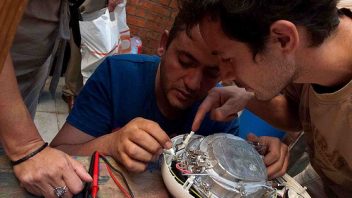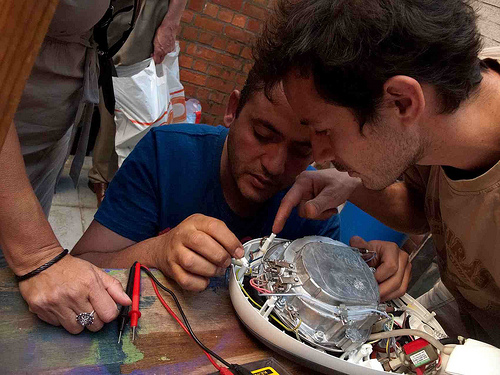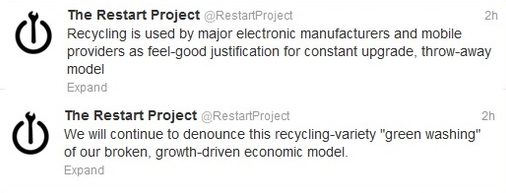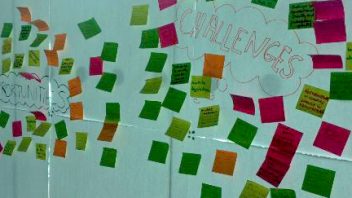
We’re grateful for today’s guest post by Michelle Bastian from the Sustaining Time project, which addresses the most intriguing question ‘What is the time of a sustainable economy?’The project is based around the idea that different kinds of economic systems seem to be associated with different kinds of time. For example, industrial capitalism with clock time, and late capitalism with a speeded up, 24/7 networked time. So the team areexploring whether attempts to build new alternative economies are making new kinds of time as part of the process. The article is based on an interview with our friends at The Restart Project recently selected as one of the top Transition orientated enterprises. Enjoy!
Michelle Bastian: As well as visiting a number of UK archives, we will also be developing a range of case studies. Over the course of the project I will be visiting organisations who are trying to develop alternative economic models. I’ll be exploring whether this then leads to using, or thinking about, time in different ways. I’ll be visiting about 9 or 10 organisations in total and will be sharing what comes up along the way here on the blog.
I visited The Restart Project early last month, my first case study for Sustaining Time. Restart was started by Janet Gunter and Ugo Vallauri in 2012. Their mission is to help grow a more widespread culture of repair. They organise Restart Parties in London twice a month, where people can bring along their broken gadgets and work with the Restart repairers (or Restarters) to try and find a fix. These events encourage more people to think about repair as a possible option for their gadgets, to become better skilled and to also save repairable items from ended up as landfill. 
They are starting small, but Janet and Ugo have big ambitions for their project. The are creating a world map of similar projects and are hoping to scale up their approach to support a global network of Restarters. They also clearly see themselves as contributing to a different kind of economy – laying the groundwork for the future, which they believe will be much more geared towards maintenance and repair than about continuing to buy more new stuff (see here).
Like most (if not all) of the organisations I’m visiting, time is not really an explicit issue in their work. However, weaved throughout their website are quite a few examples where they appear to be challenging dominant temporal paradigms around use and value. I’ll be exploring these in a series of posts.
The first example of is their interest in questioning the life cycle of electronic goods. Rather than a model where we buy, use and discard, they state that they are seeking to promote “positive behaviour change by encouraging and empowering people to use their electronics longer.” Initially I wondered whether this meant they were interested in supporting a shift to a circular economy rather than a linear one. Arguably this kind of economy would draw on a sense of time which connected up the past and the future, by paying more attention to how things were produced prior to use and what would happen to them afterwards. This idea of the circular economy is explicitly contrasted with a linear model by a range of organisations interested in waste reduction (see here and here).
However, when I asked Janet and Ugo about whether they saw themselves and moving towards a more circular or cyclical sense of time in relation to gadgets and repair, they expressed strong reservations. The danger of thinking in terms of the cycle, seems to be that this encourages people to think first about recycling, rather than about the ways their gadgets could continue to be useful now and into the future. Part of the reason they chose Restart for their name, rather than something with recycle in the name for instance, was to pick up on the way that for many electronic items the first solution to a problem is to simply to turn it off and then on again. That is, as Ugo said you “restart it and give it a second life, which didn’t necessarily mean that it had to be taken apart”. For the Restart project, recycling should be an absolute last resort and instead the emphasis is on prolonging your relationship to the gadgets you own.
Their critical intervention into the short disposable time of current consumerism is thus not to champion a seemingly more ‘natural’ circularity. At least not a small circle that would move straight from use to recycle. Rather a more sustainable time for electronics comes from expanding the length of time we use our gadgets and prolonging our relationships with them. Recognising the way we have come to perceive something as old or obsolete every couple of years, they challenge the temporal boundaries that constrict ‘usefulness’ to such a short period. For example when people ask them what smartphone they should buy, their answer is “The one you already have. Keep it”. For Ugo and Janet, their ethic of time relates well with the New Materialism proposed by Andrew Simms and Ruth Potts. The second statement in their manifesto, for example, is “Wherever practical and possible develop lasting relationships with things by having and making nothing that is designed to last less than 10 years” (2012, 27 [PDF]). What is really interesting about this is that Restart seem to be suggesting that a particular kind of linear time, which is often thought to be the bane of sustainability, might actually be more suitable than a straightforward shift to a cyclical framework.
Michelle Bastian

EDIT: As I was writing this blog Restart were posting some great tweets about their views on recycling,particularly focused on O2’s “Change Your Phone as Often as You Change Tubes” ad campaign. Go here to see the tweets.
Credits: Image: The Restart Cafe Brussels







Connect